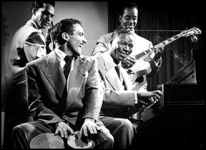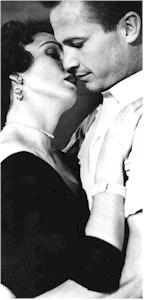Flash! Bam! Alakazam! |  |
|
What is it about Nat "King" Cole's voice which makes grown men go weak at the knees? One of those hard-to-define properties, earthy blues mixed with a knowing tip of hand against forehead as he captures that romantic sigh and swoon. I expect that his success was based more on the ability to bring a spontaneity of feeling to the twists and turns of even mundane lyrics, infusing throwaway pieces like 'Riffamarole' with the sleight of hand and dexterity which comes from being, first and foremost, a jazz pianist. Unlike Billy Eckstine, who was black and brought an insolent swagger and undisguised sense of sexual tease to his singing, to the point where he directly influenced Elvis, early Elvis that is, Jailhouse Rock Elvis before the bloated inflation of the Dino-style croon of 'It's Now or Never'. Cole's combination of keen ballad instinct with the graceful leaps and reflexes sharpened by having played with the likes of Lester Young in tightly-knit instrumental settings would account for his way of sparring with a song, attacking and prizing out the underlying atmosphere. I'm not a Man United fan, but take the best elements of Andy Cole, all strut and goal-hungry focus, and you'll get the picture. The Cole I like is less the laid-back professional of the later Capitol years, with lush orchestral arrangements and all-too-familiar material, but the Cole who was determined to hit a song where it hurts, taking the raw material by the scruff of the neck - I don't know where he got his nickname from, but it's those moments of grace and fire which earned him the title "King" alright. I remember Billy Bragg appearing on Janice Long one evening way back and choosing Cole's version of 'Nature Boy' as his all-time favourite ballad, singling out the final lines as the clinching moments, the gut-wrenching impact of Cole the wiseacre imparting the words of wisdom to the listening boy: "The greatest thing you'll ever learn/ Is just to love and be loved in return". At the time I hadn't heard the version by Big Star on Sister Lovers, where the coiled-up tenderness of world-weary Alex Chilton caresses words like "A little shy and sad of eye was he". I also hadn't heard the version on the John Coltrane Quartet Plays... album, where Coltrane delivers a finely-honed, moving account of the ballad in his own way, alongside a majestic reading of the snorting Bricusse/Newley soar of 'Feelin' Good' ("Birds flying in the sky/ You know how I feel..."). And at the time I didn't realize that Cole at his best could strike on both those levels, as deep and as melancholic as Coltrane's wholly wonderful Crescent, and as impassioned and indomitable as 'Feelin' Good'. Despite all that, I was quite shocked to read an account of Billy Strayhorn's deeply wounded response to Cole's commercial recording of possibly Strayhorn's most personal, and one of his finest, compositions, 'Lush Life'. While he never meant it to be sealed in wax, he was powerless to do a Kevin Rowland and make off with the master tapes of the offending recording. The Pete Rugolo arrangement - with its spruced-up literal treatment of a line like "A week in Paris could ease the bite of it"- was too heavy-handed, the vocal delivery too free, as David Hajdu describes it in the Strayhorn biography, Lush Life. And, most cardinal of all for the composer, Cole commits the offence of fluffing some of the words- sung the Cole way, he strikes with iron blows rather than the gardenia scent Strayhorn intended, the final lines emerging as "I'll rot with the rest/ Of those who lives are lonely too!". And yet it still works for me, the errors adding to the power of the lyric, intensifying the sweep of the two "l"'s twinned with the two "r"'s of the previous line. In this case the pretensions of being taken seriously as a classical jazz composer, rather than the other way round, would have short-circuited Strayhorn's tolerance of the crime against taste committed by Cole. And I imagine the glaring errors of Cole's nonchalant one-take approach wouldn't have helped matters. Like Sinatra, I expect he wasn't enamoured of studio polish and perfectionism at this stage. | |

| While Cole didn't quite have the spontaneous fire as an actor which could have lit up the screen the way Sinatra did on occasion, he had several other ace recording moments up his sleeve. Take his contribution to the opening credit sequence of Robert Aldrich's masterful film noir, Kiss Me Deadly, of 1955. Mickey Spillane's hero is transformed into an ugly, bull-headed sleaze, a private dick rather than a suave sleuth- when he leaves the room after a police investigation, you hear the officers behind him ask to open the windows- "let some air in". It's also one of the most explicit anti-fascist, anti-McCarthy films made, with enough narrative surprises to keep you guessing long after the screen dissolves in pure white light white heat amid the singing sting of the nuclear explosion letting out its banshee wail. Cole sings a composition by Aldrich's regular soundtrack composer Frank DeVol- called 'Rather Have the Blues', it's introduced by the slick tones of a late-night female DJ. The radio clicks on as Mike Hammer drives into a pitch-black late-night cruise into Celine territory with the femme fatale escaped from a laughing-house. Cole delivers a maimed, emotionally ravaged account of the lyric, perfect commentary on the hard-as-nails anti-hero, and when he sings "I'd rather have the blues than what I've got" you don't yet realize that that's exactly what's in store when things get rather convoluted, and brute force isn't enough to save your skin. As a song it's a miracle of subtlety when compared to the unalloyed savagery of Spillane's dumb ox alter ego. I love the fact that 44 years after the fact, Spillane himself still can't abide the film, going on record this week to distance himself from what I'd say is the apogee of '50s film-making, plumbing as it does the darkest recesses of the noir fantasy of fast cars, loose broads and hot money. Again, Aldrich played by his own rules, dared to defy cinematic clich, dared to turn Spillane's world upside down. |
There's also the triumphant clarion call of '50s popular song delivered by Cole in the form of 'Orange Colored Sky'. It's one of those great headlong rushes, a life-affirming yell, up up and away. I don't think the songwriting pairing of Delugg-Stein were responsible for many more gems like this, but when you hear the full-tilt hedonism of the Rugolo arrangement, galvanizing the full might of Stan Kenton's orchestra with its high-class West Coast alumni of Art Pepper and Bud Shank on alto sax and, amongst others, Maynard Ferguson, Chico Alvarez and Shorty Rogers on trumpet, you're prepared to suspend your disbelief. I love the way Cole turns the story into a two-way duel between himself and the full force of the orchestra on backing vocals, playing for higher stakes at each turn, playing for keeps as the chorus intones the Roy Lichtenstein jabs of 'flash! bam! alakazam!' While it only lasts 2ż minutes, it's as upbeat and ecstatic a piece of pop jazz you'll find from the era. In a nutshell it sets the seal for Kevin Rowland's 11-minute exploration of similar territory, 'This is What She's Like', where again every second is probed and stoked for maximum emotional yield, where the pauses and controlled silences are as powerful as any words could be. And if Mr. Rowland still happens to be looking for a good definition of the Italian word for thunderbolt, the electric stabs of Kenton's chorus on 'Orange Colored Sky' are about as potent as any. © Marino Guida 1999. | |